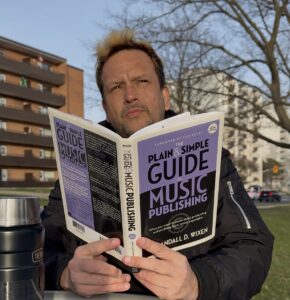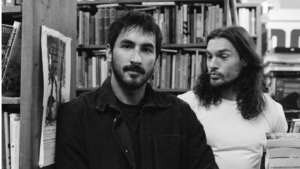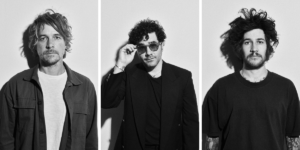The Burnout Society in the Music Industry / La sociedad del cansancio en la industria de la música

Are We Sacrificing Creativity and Mental Health for Success? / ¿Estamos sacrificando la creatividad y la salud mental por el éxito?
In a world where productivity and success are measured in streams, followers, and endless tours, the music industry has become a perfect reflection of what Byung-Chul Han describes in his book The Burnout Society. How does this culture of performance affect artists and music professionals? Are we prioritizing quantity over quality, success over well-being? In this article, we explore how Han’s ideas can help us rethink how we approach creativity and mental health in our industry.
En un mundo donde la productividad y el éxito se miden en streams, seguidores y giras interminables, la industria de la música se ha convertido en un reflejo perfecto de lo que Byung-Chul Han describe en su libro La sociedad del cansancio. ¿Cómo afecta esta cultura del rendimiento a los artistas y profesionales de la música? ¿Estamos priorizando la cantidad sobre la calidad, el éxito sobre el bienestar? En este artículo, exploramos cómo las ideas de Han pueden ayudarnos a repensar la forma en que abordamos la creatividad y la salud mental en nuestra industria.
1. The Self-Exploitation of Artists: Creativity or Burnout? / La autoexplotación del artista: ¿Creatividad o agotamiento?
Byung-Chul Han talks about a society where we no longer need external control because we exploit ourselves in pursuit of success. In the music industry, this translates into artists who work non-stop: composing, recording, promoting, performing, and maintaining a constant presence on social media. The question is: are we fostering creativity or simply exhausting artists?
Think about the latest release from a famous artist. Behind that song playing everywhere, there are endless hours of work, pressure to exceed expectations, and a constant fear of being forgotten. Is this sustainable?
Byung-Chul Han habla de una sociedad donde ya no necesitamos que nos controlen desde fuera, porque nosotros mismos nos explotamos en busca de éxito. En la industria de la música, esto se traduce en artistas que trabajan sin descanso: componen, graban, promocionan, actúan y mantienen una presencia constante en redes sociales. La pregunta es: ¿estamos fomentando la creatividad o simplemente agotando a los artistas?
Piensa en el último lanzamiento de un artista famoso. Detrás de esa canción que suena en todas partes, hay horas interminables de trabajo, presión por superar las expectativas y un miedo constante a ser olvidado. ¿Es esto sostenible?

2. The Tyranny of ‘You Can Do It’ in Music / La tiranía del ‘sí se puede’ en la música
The culture of self-improvement has deeply infiltrated the industry. Phrases like «you have to be consistent,» «success depends on your effort,» or «take advantage of every opportunity» are common. But what happens when that effort doesn’t lead to success? Byung-Chul Han criticizes this mindset, which can generate frustration, anxiety, and a constant sense of failure.
In an industry where success seems within everyone’s reach, but only a few achieve it, the pressure to ‘do it right’ can be overwhelming. How many artists have sacrificed their mental health in pursuit of a dream that always seems just out of reach?
La cultura de la superación personal ha calado hondo en la industria. Frases como «tienes que ser constante», «el éxito depende de tu esfuerzo» o «aprovecha cada oportunidad» son comunes, pero ¿qué pasa cuando ese esfuerzo no se traduce en éxito? Byung-Chul Han critica esta mentalidad, que puede generar frustración, ansiedad y una sensación de fracaso constante.
En una industria donde el éxito parece estar al alcance de todos, pero solo unos pocos lo logran, la presión por ‘hacerlo bien’ puede ser abrumadora. ¿Cuántos artistas han sacrificado su salud mental por perseguir un sueño que parece siempre fuera de su alcance?

3. The Loss of Pause: Where Does Creativity Go?/ La pérdida de la pausa: ¿Dónde queda la creatividad?
Han argues that we have lost the ability to pause, reflect, and simply «be.» In music, this is especially concerning. Creativity needs time to flourish, but in a hyper-connected world, artists rarely have space to breathe. How can we expect innovative ideas to emerge if there is no time for contemplation?
Imagine a composer who, instead of sitting down to explore new ideas, is constantly worried about meeting deadlines, answering emails, and maintaining their social media image. Where is the space for authentic creation?
Han argumenta que hemos perdido la capacidad de detenernos, reflexionar y simplemente «ser». En la música, esto es especialmente preocupante. La creatividad necesita tiempo para germinar, pero en un mundo hiperconectado, los artistas rara vez tienen espacio para respirar. ¿Cómo podemos esperar que surjan ideas innovadoras si no hay tiempo para la contemplación?
Imagina a un compositor que, en lugar de sentarse a explorar nuevas ideas, está constantemente preocupado por cumplir plazos, responder correos y mantener su imagen en redes sociales. ¿Dónde queda el espacio para la auténtica creación?
4. Mental Health: The Topic No One Talks About / Salud mental: El tema del que nadie habla
The music industry has a mental health problem. Although the topic is being discussed more, many artists still feel they cannot show vulnerability. Byung-Chul Han critiques the culture of toxic positivity, which forces us to smile even when we are suffering. In music, this translates into artists hiding their struggles to avoid appearing ‘weak’ or ‘unprofessional.’
How many artists have had to cancel tours or step away from the stage due to mental exhaustion? Instead of judging, we should ask ourselves what we are doing wrong as an industry that allows this to keep happening.
La industria de la música tiene un problema con la salud mental. Aunque cada vez se habla más del tema, muchos artistas siguen sintiendo que no pueden mostrar vulnerabilidad. Byung-Chul Han critica la cultura de la positividad tóxica, que nos obliga a sonreír incluso cuando estamos sufriendo. En la música, esto se traduce en artistas que ocultan sus problemas para no parecer ‘débiles’ o ‘poco profesionales’.
¿Cuántos artistas han tenido que cancelar giras o alejarse de los escenarios debido al agotamiento mental? En lugar de juzgar, deberíamos preguntarnos qué estamos haciendo mal como industria para que esto siga ocurriendo.

5. Toward a More Humane Industry: What Can We Do? / Hacia una industria más humana: ¿Qué podemos hacer?
Byung-Chul Han not only criticizes but also proposes alternatives. Instead of valuing people solely by their productivity, he suggests prioritizing well-being and authenticity. How can we apply this to the music industry?
- Foster spaces for pause and reflection: Give artists time to explore ideas without pressure.
- Prioritize mental health: Create support programs and normalize conversations about emotional well-being.
- Value quality over quantity: Stop measuring success only in terms of streams or followers.
Imagine an industry where artists can create without fear of failure, mental health is a priority, and success is measured in numbers, impact, and authenticity. That is the future we can build.
Byung-Chul Han no solo critica, sino que también propone alternativas. En lugar de medir el valor de las personas por su productividad, sugiere priorizar el bienestar y la autenticidad. ¿Cómo podemos aplicar esto en la industria de la música?
- Fomentar espacios de pausa y reflexión: Dar a los artistas tiempo para explorar ideas sin presión.
- Priorizar la salud mental: Crear programas de apoyo y normalizar las conversaciones sobre bienestar emocional.
- Valorar la calidad sobre la cantidad: Dejar de medir el éxito solo en términos de streams o seguidores.
Imagina una industria donde los artistas puedan crear sin miedo al fracaso, donde la salud mental sea una prioridad y donde el éxito no se mida solo en números, sino en impacto y autenticidad. Ese es el futuro que podemos construir.
Conclusion / Conclusión:
Byung-Chul Han invites us to question the performance-driven culture that dominates our society and, by extension, the music industry. In a world where the pressure for success can drain even the most talented, it is time to rethink how we approach creativity and well-being. The Burnout Society is not just a critique but a call to build a more humane industry, where music and those who create it can thrive without sacrificing their mental health.
What do you think about the pressure for success in the music industry? Do you believe we are prioritizing productivity over creativity and well-being? I invite you to read The Burnout Society and reflect on how we can contribute to positive change from our own place. Share your thoughts in the comments!
Byung-Chul Han nos invita a cuestionar la cultura del rendimiento que domina nuestra sociedad y, por extensión, la industria de la música. En un mundo donde la presión por el éxito puede agotar incluso a los más talentosos, es hora de repensar cómo abordamos la creatividad y el bienestar. «La sociedad del cansancio» no es solo una crítica, sino una llamada a construir una industria más humana, donde la música y quienes la crean puedan florecer sin sacrificar su salud mental.
¿Qué opinas sobre la presión por el éxito en la industria de la música? ¿Crees que estamos priorizando la productividad sobre la creatividad y el bienestar? Te invito a leer «La sociedad del cansancio» y a reflexionar sobre cómo podemos, desde nuestro lugar, contribuir a un cambio positivo. ¡Comparte tus ideas en los comentarios!








